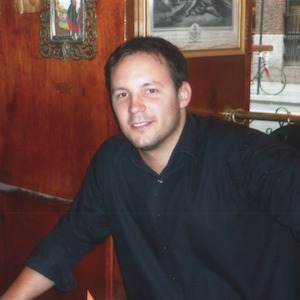
Mirko Sardelić, picture taken from the website.
Mirko Sardelić completed his 16-month project called The role of emotions in contacts between Eurasian cultures. Representation of the Oriental Other in Medieval and Early modern Central Europe (Emotions Otherness) as a NEWFELPRO fellow. The first phase of the project was conducted at the University of Western Australia; ARC Centre of Excellence for the History of Emotions (Europe 1000-1800). He did the return phase of the project at the Department of Historical Research of the Croatian Academy of Sciences and Arts in Zagreb.
The main objective of the project was to identify the most important patterns in which the emotions were used to form representations of self and the other; and to analyze how have these representations been fed into the construction of identities. The approach was multidisciplinary. Historical imagology was employed on textual sources to detect and analyze the images created by the relevant authors. It was supported by other disciplines: cultural anthropology, intellectual history, art history, sociology, psychology etc. in order to identify the key elements in the role of emotions in the intercultural contacts in Central Europe. In this multidimensional reconstruction and interpretation of processes there were two main axes: time and space. The timeline was set from 1200 to 1700, and the space component was divided into three: geographical, social and imaginary space.
Results of his project can be find in following:
The main objective of the project was to identify the most important patterns in which the emotions were used to form representations of self and the other; and to analyze how have these representations been fed into the construction of identities. The approach was multidisciplinary. Historical imagology was employed on textual sources to detect and analyze the images created by the relevant authors. It was supported by other disciplines: cultural anthropology, intellectual history, art history, sociology, psychology etc. in order to identify the key elements in the role of emotions in the intercultural contacts in Central Europe. In this multidimensional reconstruction and interpretation of processes there were two main axes: time and space. The timeline was set from 1200 to 1700, and the space component was divided into three: geographical, social and imaginary space.
Results of his project can be find in following:
- Sardelić, Mirko. "The Cuman-Qipčaqs between Asia and Europe in the Late Middle Ages." Migracijske i etničke teme 31.2 (2015): 247-274.
- Sardelić, Mirko. "Model proučavanja i izazovi povijesti emocija – skica." Historijski zbornik 68.2 (2015): 395-402.
- Sardelić, Mirko. "Emotions and imaginary of the Mongol Other in the mid-13th-century Europe", Publisher TBD, to be published in 2017.
- Sardelić, Mirko. "The Late 16th-Century Ship in the Adriatic as a Cross-cultural System", a chapter in the book From Riverbed to Seashore. Art on the Move in Eastern Europe and the Mediterranean in the Early Modern Period (edited by Alina Payne, out of the press in mid-2017, publisher is Brill).
- Sardelić, Mirko. The role of Emotions in Contacts between Euroasian Cultures – Representation of the Oriental Other (publisher TBD, the book should be out of the press by the end of 2017).
Additionally, he gave paper at five international conferences and participated in several seminars, workshops and colloquia:
- Paper: ‘Uluc-Ali’s Adriatic campaign of 1571: emotions and consequences’ (Harvard University, 2 February 2015).
- Paper: ‘Renaissance ship in the Adriatic as a cultural system’ (New Europe College, Bucharest, 12-13 June 2015);
- Paper: ‘Ut metum incuterent: Mongol violence in medieval Europe’ (UWA, Perth, 12 September 2015).
- Paper: ‘The Procession with the Cross: The Penitence of a Renaissance Adriatic island’ (CHE Adelaide, 18-19 February 2016).
- Paper: ‘Sir Thomas G Jackson’s Dalmatia’ (Institute for Art History, Split, 24-28 May 2016).
- Seminar: More of the Heart than the Brain: Erasmus and Calvin on Affective Knowing, by UWA Postdoc Kirk Essary (March 2015).
- Seminar: Living anxiously: Governing the senses in early modern England by Danijela Kambasković, English and Cultural Studies Work-in-progress seminar series, UWA, (April 2015).
- Seminar: Sex, Christian Charity and Merging Bodies: The logic of Human Communities in Descriptions of Medieval Heretical Sex by Michael Barbezat, UWA, (April 2015).
- Postdoctoral Harvard seminar/mobile workshop: From Riverbed to Seashore: Art on the Move, (Istanbul, Plovdiv, Moldova, Transylvania, Wallachia); papers given by all participants (June 2015).
- Workshop: Naming Pain, ECRs Anna Corrias and Naama Cohen-Hanegbi, UWA, (August 2015).
- History seminar: Shaping Matter: the Role of the Imagination in the Philosophy of Marcilio Ficino by ECR Anna Corrias (Princeton, USA), UWA, 2015.
- Seminar: And give the physician his place, for the Lord created him: Trust, Faith and medical care in late medieval Spain by ECR Naama Cohen-Hanegbi (Tel-Aviv University, Israel), UWA, 2015.
- CHE Methods Collaboratory, All Cls: All Postdocs, Senior Research Fellows, 23-24 September 2015, University of Sidney.
One of the main accomplishments of his project was the creation of the Centre for the Study of Emotions in Cross-cultural Exchange (Centar za transkulturno istraživanje emocija) in Croatia.The main goal of the Centre is to foster collaborative research on various topics related to the study of emotions in the cross-cultural settings of Southeast Europe and elsewhere. Centre ECCE has been established with a focus on the interdisciplinary nature and benefits of emotions history, and involves scholars from various disciplines. The first workshop is planned for June 2017 and the first seminar for September 2017.
